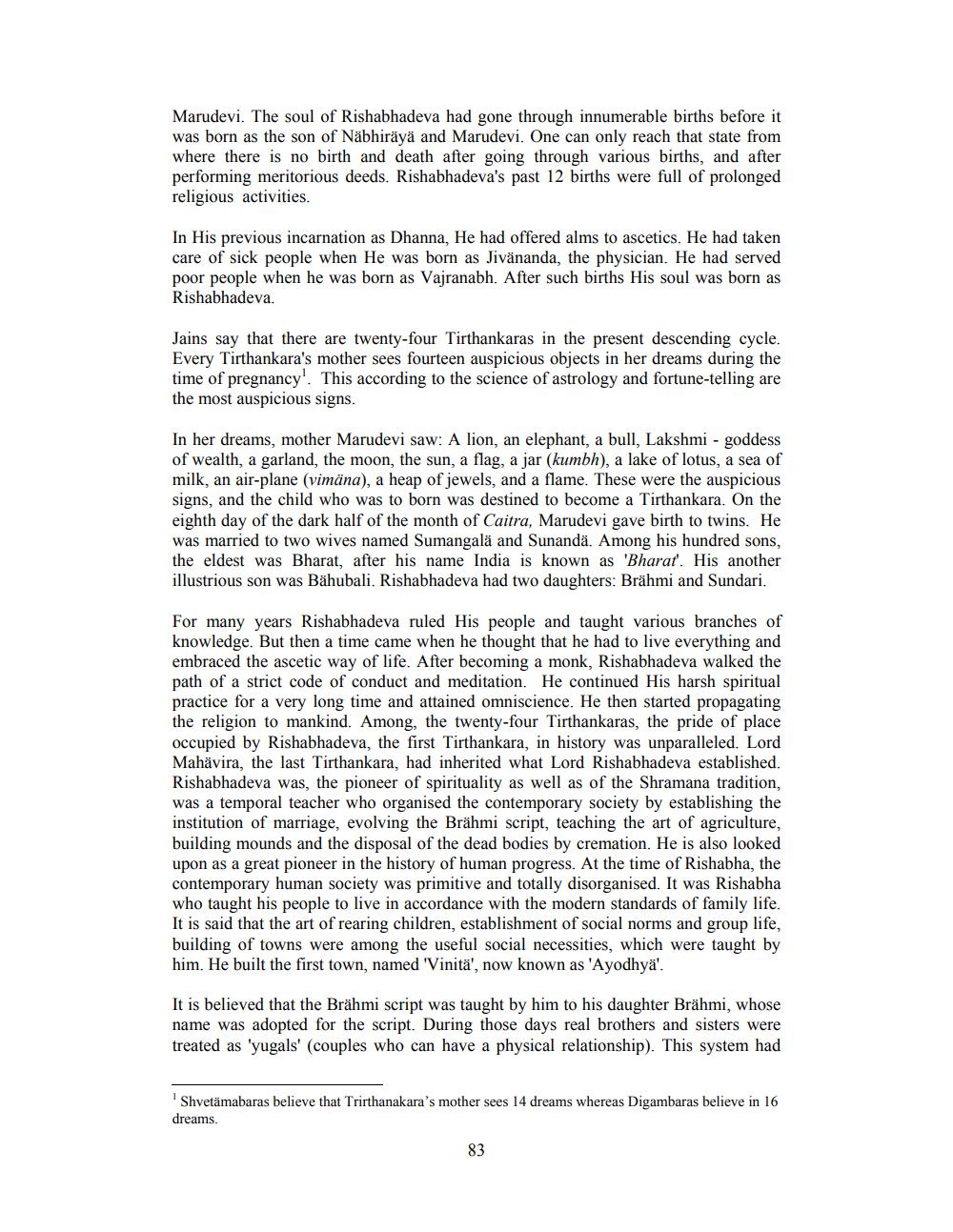________________
Marudevi. The soul of Rishabhadeva had gone through innumerable births before it was born as the son of Näbhiräyä and Marudevi. One can only reach that state from where there is no birth and death after going through various births, and after performing meritorious deeds. Rishabhadeva's past 12 births were full of prolonged religious activities.
In His previous incarnation as Dhanna, He had offered alms to ascetics. He had taken care of sick people when He was born as Jivänanda, the physician. He had served poor people when he was born as Vajranabh. After such births His soul was born as Rishabhadeva.
Jains say that there are twenty-four Tirthankaras in the present descending cycle. Every Tirthankara's mother sees fourteen auspicious objects in her dreams during the time of pregnancy'. This according to the science of astrology and fortune-telling are the most auspicious signs.
In her dreams, mother Marudevi saw: A lion, an elephant, a bull, Lakshmi - goddess of wealth, a garland, the moon, the sun, a flag, a jar (kumbh), a lake of lotus, a sea of milk, an air-plane (vimäna), a heap of jewels, and a flame. These were the auspicious signs, and the child who was to born was destined to become a Tirthankara. On the eighth day of the dark half of the month of Caitra, Marudevi gave birth to twins. He was married to two wives named Sumangala and Sunanda. Among his hundred sons. the eldest was Bharat, after his name India is known as 'Bharat'. His another illustrious son was Bahubali. Rishabhadeva had two daughters: Brähmi and Sundari.
For many years Rishabhadeva ruled His people and taught various branches of knowledge. But then a time came when he thought that he had to live everything and embraced the ascetic way of life. After becoming a monk, Rishabhadeva walked the path of a strict code of conduct and meditation. He continued His harsh spiritual practice for a very long time and attained omniscience. He then started propagating the religion to mankind. Among, the twenty-four Tirthankaras, the pride of place occupied by Rishabhadeva, the first Tirthankara, in history was unparalleled. Lord Mahävira, the last Tirthankara, had inherited what Lord Rishabhadeva established. Rishabhadeva was, the pioneer of spirituality as well as of the Shramana tradition. was a temporal teacher who organised the contemporary society by establishing the institution of marriage, evolving the Brähmi script, teaching the art of agriculture, building mounds and the disposal of the dead bodies by cremation. He is also looked upon as a great pioneer in the history of human progress. At the time of Rishabha, the contemporary human society was primitive and totally disorganised. It was Rishabha who taught his people to live in accordance with the modern standards of family life. It is said that the art of rearing children, establishment of social norms and group life, building of towns were among the useful social necessities, which were taught by him. He built the first town, named 'Vinitä', now known as 'Ayodhya'.
It is believed that the Brähmi script was taught by him to his daughter Brähmi, whose name was adopted for the script. During those days real brothers and sisters were treated as 'yugals' (couples who can have a physical relationship). This system had
Shvetämabaras believe that Trirthanakara's mother sees 14 dreams whereas Digambaras believe in 16 dreams.
83




